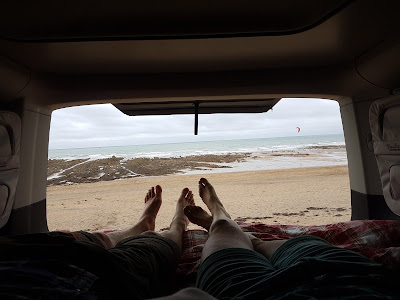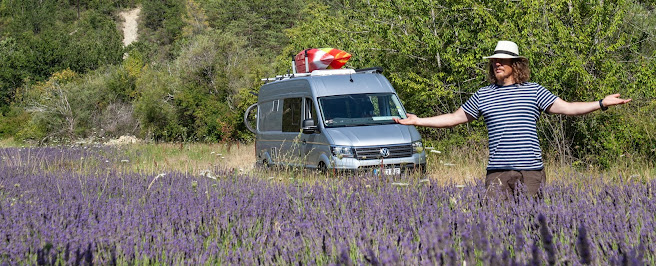BIG QUESTIONS: How can you be a camping eco hero?
It isn't easy being green.
But, as campers, campervanners, motorhomers and lovers of the great outdoors, it is our duty to take care of that which gives us so much pleasure. So, I'd like to propose (again) for 2016, the mantra for all camping trips. This is simple. It's also easy. And it's a recurring theme for me.
LEAVE IT NICER.
What I mean by this is that we should leave anywhere we stay – a camp site, wild spot, wherever, nicer than it was when we arrived. This can work on many levels but on a basic one it means making sure your spot is immaculate when you depart. How can you do this?
PICK UP LITTER
I don’t really care if it isn’t your litter, just pick it up. It really won’t kill you and you’ll feel great for doing your bit. If it’s on your patch you should pick it up and dispose of it properly, irrespective of the source. Anyone who sees you camping and then sees litter will put two and two together and make a number that marks you as the culprit.
If you leave somewhere and there is a mess (even if it isn’t yours) we will all get the blame for it. And the consequences of that are that there will be fewer and fewer places where we are welcome. Height barriers will go up, rocks will appear on laybys and the dreaded ‘No Camping or Overnight Parking’ signs will breed. The active way of reversing this trend and making local councils wake up to us as a feasible 'market' (and therefore make it easier for us to overnight) is to be a shining example of green practice.
FORGET SINGLE USE PLASTICS
Everything comes in plastic these days. Salad, bananas, cucumbers, water, hummus, potato salad. It’s, frankly, ridiculous the amount of packaging that our supermarkets and food stores force on us. Even when we don’t need it. It’s almost as if bananas, cucumbers and apples didn’t have a protective outer casing on them anyway. Plastics don’t biodegrade and will eventually end up in rivers, watercourse, storm drains and sewers where they will enter the sea, become toxic and kill. There is no nice way of putting it.
So if you can, please forget the single use plastics. The problem with them is that they don’t biodegrade, turn toxic in water and break down into microplastics that will, in time, hurt us all. So, take your tin mug into Costa, refill a water bottle instead of buying bottled (Europe’s tap water is the best in the world), refuse plastic forks and knives and only take on plastics that can be recycled (if at all). Do this and you’ll be doing the shopping equivalent of leaving it better because you’ll create less waste and less demand for plastics. If we all did it things would change.
BUY LOCAL
Buying local makes so much sense. Why? Because you are putting your money directly into the local economy instead of into a supermarket that cares for nothing but profit. If you give you money to local shops you generally get local produce that hasn’t been half way around the world (and therefore has fewer food miles) and have a chance to enrich the entire local economy. You might also meet some nice people too. People are nice, in general, and it’s great to meet them. You might also discover something unusual or very special; when you buy local. And it’s a darn sight better than a soulless supermarket experience.
EAT WITH THE HARVEST
There is a green leafy cabbage-like plant called ‘hunger gap’. It’s a really tasty green and I love eating it when it’s in season, which is during the ‘hunger gap’ between winter greens and spring vegetables. It’s a wonderfully evocative and quite humbling vegetable simply because it has a job to do and it does it well. It’s available when nothing else is. You can buy it locally when it’s just been picked so it’ll be as good as any green. It’s the same throughout the year with other foods. If you can eat with the seasons then you’ll save lots of carbon (the old footprint issue) and will eat food that is local, fresh and about as good as it gets.
HOW TO BE AN AMATEUR ECO HERO IN TEN EASY STEPS:
Anyone who camps cannot fail to be an environmentalist too, by default. Why destroy the thing which you camp to enjoy? It doesn’t make sense.
1. Leave it nicer. Clean up when you arrive and before you leave.
2. Take your own bag shopping.
3. Don’t damage the environment in which you camp.
4. If you need a coffee, take your tin mug with you to get one. Refuse single use coffee cups.
5. Eat locally as much as possible.
6. Eat seasonally as much as possible.
7. Recycle EVERYTHING. If it can’t be recycled, refuse it.
8. Reuse water bottles or packaging if you can.
9. Buy staples in bulk to save packaging and decant as you need it.
10. Buy once, buy well. Well made kit will last more than 5 minutes and won't need replacing. Man made fabrics don't biodegrade so once they have gone to landfill they will persist. Take a look at ventile cotton...
Thanks for listening.
The Camper Van Bible is out on June 2nd.




Here Here, great advice....
ReplyDeleteI love your show. I want to watch the show endless that I never like it to end. Its really great. Keep up the great work. Wish you do more and more shows and treat us viewers with great landscapes and wonderful recipes.
ReplyDeleteI love your show. I want to watch the show endless that I never like it to end. Its really great. Keep up the great work. Wish you do more and more shows and treat us viewers with great landscapes and wonderful recipes.
ReplyDelete